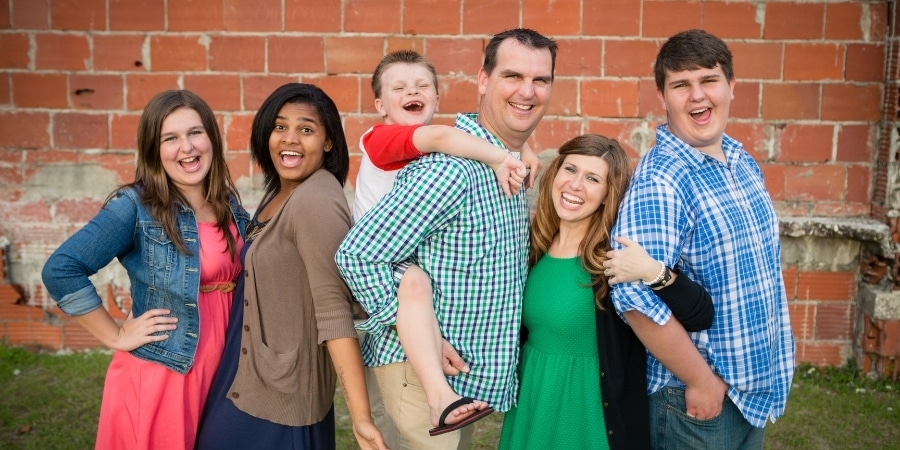Do you have a heart for children?
Have you ever considered becoming a foster caregiver?
Or wanted to learn more about foster care but weren’t sure where to start?
We’ve partnered with Heartland for Children to tell you more about foster care, address some common misconceptions, and let you know where to get more information or how to start the process of becoming a foster caregiver.
Foster caregivers are individuals or couples in our community that offer children and youth safety and acceptance while being placed in their homes temporarily because they have experienced abuse and/or neglect.
If you have a desire to serve children, make a difference in our community, and impact lives, keep reading to learn more about becoming a foster caregiver.
Q&A Video with Heartland for Children
What is foster care?
Foster care is a temporary foster home placement for a child or siblings whose birth parent is currently unable to care for them.
Foster caregivers are adults who provide a loving, safe, and secure home-like setting to these children on a temporary basis.
The goal of foster care is to reunite children with their biological parents or other family members.
Why do children enter foster care?
Children entering foster care are removed from their homes due to the actions of their parents – issues such as violence, abuse, abandonment or neglect. In Polk County, the most common reasons for a child(ren) being removed from their parents is domestic altercations and substance use. Children are NOT placed into foster care due to their own behaviors, they are in foster care by no fault of their own. All children deserve to feel safe in a home environment and foster caregivers help provide this supportive care when a biological parent is unable to do so.
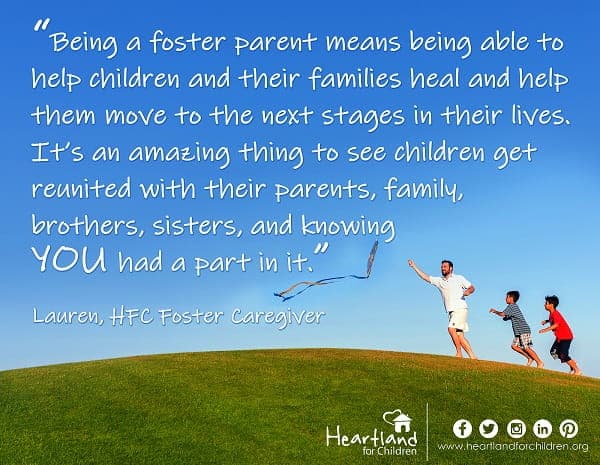
Who coordinates foster care in Polk County?
Heartland for Children is the lead agency for Community Based Care in Polk, Hardee and Highlands counties. Heartland for Children oversees a comprehensive child welfare network that includes protective services, foster care, adoptions, independent living, prevention, mental health, family preservation, family support services and other related services. They partner with many local agencies providing these services to families in our area.
How can you learn more about foster care?
It is easy to learn more about becoming a foster caregiver! Start with a phone call to Heartland for Children at (863) 519-8900 x 289 to learn more or visit their website at heartlandforchildren.org. The Heartland for Children staff complete a basic phone interview and sign you up for a virtual Foster Care Information Session. These information sessions are free and non-committal, meaning you are under no obligation. Simply sign-up, listen, and ask questions.
What are the steps to becoming a foster caregiver?
Once you have participated in a Foster Care Information Session or have decided you’re ready to start the licensing process, the next step is to sign up for one of their 3-week Virtual Foster Care classes that are offered on Tuesday/Thursday evenings or on Saturdays. During this time you will also complete licensing documentation, have a home assessment and background screening completed by your licensing counselor.
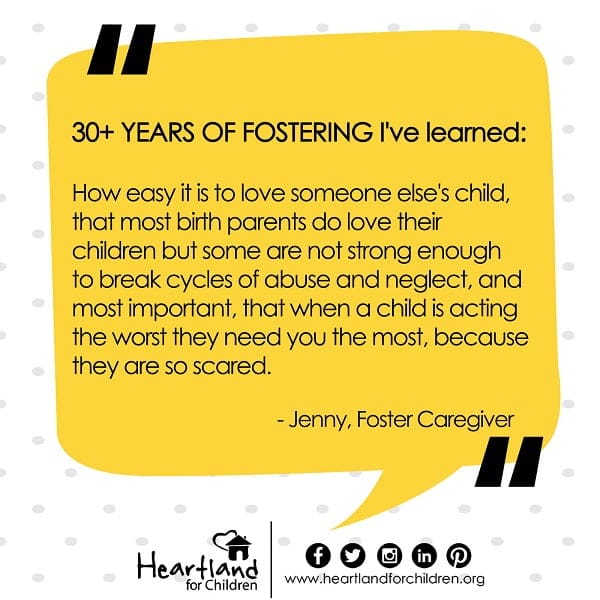
Misconceptions about foster care
Let’s be honest… there are a LOT of misconceptions about foster care. From worrying the kids are “bad kids” to wondering if someone will show up on your doorstep and hand you a baby with no supplies, getting past these myths is the first step to encouraging people to consider becoming a foster caregiver. A few of the most common misconceptions are listed below, and Heartland for Children has a longer list of myths and facts on their website.
✖️ Children in foster care are bad kids.
When I asked current foster caregivers about the #1 misconception they hear, this was the first response from all of them. Here is what they want potential caregivers to know:
“These children are not bad. They are survivors who are struggling, a lot of them with a form of PTSD. These kids are strong, they are warriors but they are also scared. These kids are looking for structure, love, and a sense of trust and stability. When they get out of their fight/flight stage these children are AMAZING! They just need someone to fight for them during that tough period.”
-Tiffany, Foster Caregiver of 8 years
“They are just kids needing a stable and loving place to heal and be safe.”
-Beth Ann, Foster Caregiver of 5 years
✖️ Foster care is the first step towards Adoption.
The goal for children that enter foster care is to be reunified with their biological families, so this is not the best way to expand your family by adoption. Foster parents should be supportive of helping families reunite. Children love their parents and want to go home when it is safe to do so.
Heartland for Children does have a specific track designed specifically for those families wanting to adopt children.
Click here to learn more about Adoption through Heartland for Children.
Click here to view the Heart Gallery.
✖️ You won’t have control over what age or gender child will be placed in your home.
Heartland for Children works to find the best fit for each child and each family. You can specify the age or gender of children you are able to care for temporarily in your home. Current foster caregivers told me they expanded their age range once they became more comfortable with the process.
✖️ You will end up with a child who has medical needs or other special needs.
There are foster caregivers that are designated providers for children with medical needs or special needs. A child will not be placed into your care with these needs unless you are capable of providing that care. Heartland for Children does have a need for medical foster homes. There is additional training and supports offered to medical homes.
✖️ You have to accept any child they want to place in your home.
Before a child is placed with a foster caregiver, Heartland for Children has worked with each family to determine the best fit for a child or sibling group based on the information they were provided about you and your family. If you might be that right fit, you will receive a call with information available on the child being placed. You can say no if you don’t feel it is a good fit or if the timing is not right. Heartland for Children wants all children placed to be stable so it is always best to try to make the best foster care placements when possible based on the needs of both the family and child(ren).
✖️ You have to be married or a certain age to be a foster caregiver.
Foster parents can be single, married or living in a committed relationship with someone.
You must be at least 21 years old, and there is no age limit to become a foster parent.
✖️ You must have an empty bedroom for a foster child.
The criteria for sleeping arrangements are:
✖️ Foster caregivers get too attached to the children in their care.
Foster parents we talked to said they “get attached” to every child that comes to their home, but they go in with the mindset “If not me, then who?” Children coming into foster homes need safety and acceptance and this builds trust and attachment which is healthy and helps children heal from the trauma they have experienced. Remember that even if it is hard when the time comes to say goodbye, you may be the one person that can make a positive change in a child’s life forever.
Many foster caregivers stay in touch with biological families and continue to have contact after children reunite with their families. For foster caregivers that may need extra support, Heartland for Children connects them with grief counseling, and other foster caregivers are a great resource for support and encouragement.
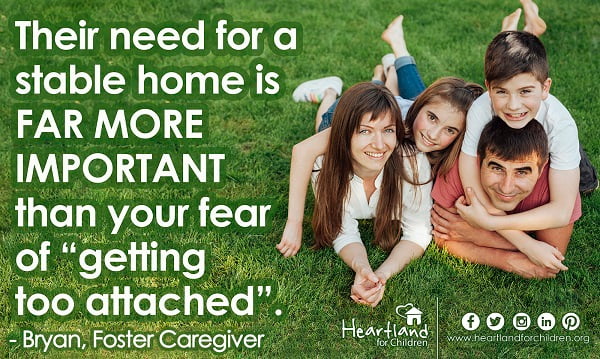
✖️ Foster care is a way to add to your income.
Foster caregivers receive a small monthly stipend (board rate per child is determined by age of the child and set by the State of Florida) to offset the expense of having a child(ren) in their home, but they are not paid an income to be foster parents. Every foster parent must meet certain requirements regarding their own financial stability before they can even be considered as a foster parent.
✖️ I can’t afford to be a foster caregiver.
You will receive a monthly stipend that helps offset the additional cost of meals and living expenses. Each child has medical insurance and there is also assistance in covering the cost of child care through the Early Learning Coalition.
Current Needs – Teens + Siblings
Currently, Heartland for Children’s greatest need is foster caregivers who will care for teens and/or sibling groups.
Even if you are not able to take on teens or multiple children, they need you! There is always a need for foster caregivers for ALL ages and both genders, as well as caregivers for children with medical and special needs. The more foster caregivers that are available, the more choices and flexibility the placement staff have in finding the best fit for each child.
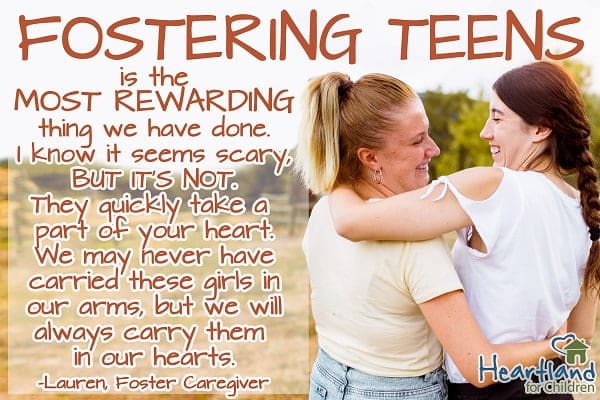
Foster Care Support
Heartland for Children provides support to all of its families through support groups, mentors assigned to new homes, annual foster caregiver fun family events, support given during the holidays with the Annual Holiday Toy Drive – Rudolph Round-Up, and shared community resources throughout the year.
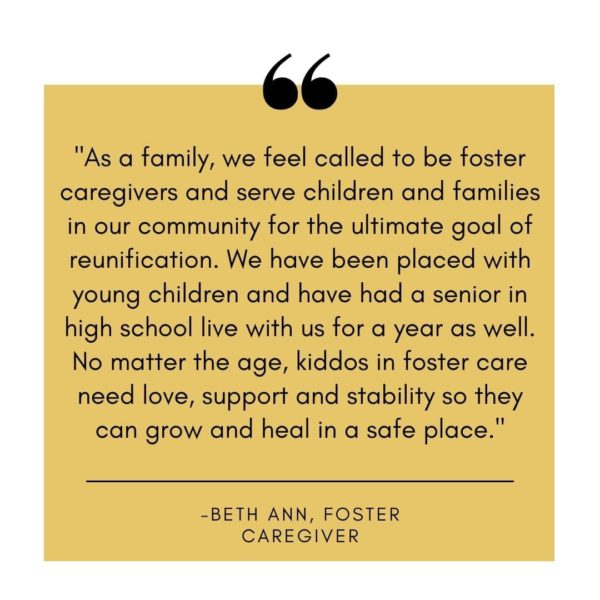
How you can support Foster Caregivers
If the mission of Foster Care tugs at your heartstrings but you aren’t physically or financially able to become a Foster Caregiver, there are other ways you can support the foster care system and these foster families:
♥ Share the need – Look for ways to help share the need for quality foster homes at your work, business, and church, and with family and friends. Because if not you, then who?
♥ Volunteer – Volunteer with local ministries and organizations that serve foster caregivers such as ECHO Ministries or LoBo Ranch.
♥ Donations – Local ministries such as ECHO Ministries and LoBo Ranch take donations of beds, gently used clothes, diapers, shoes, and furniture to help support local caregivers. (Click names to visit website and see donation locations)
Worried about fostering teens? Listen to what the Hackett’s have to say:
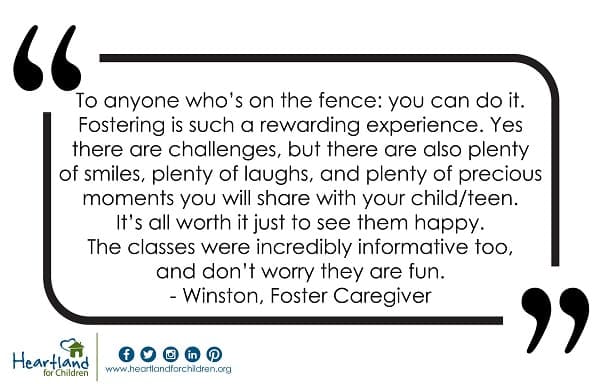
Do you still have hesitations? Check out this short video:
Learn More about becoming a Foster Caregiver
Heartland for Children would love to talk with you.
They can answer your questions and help you decide if becoming a foster caregiver is the right path for your family.
Visit their website at heartlandforchildren.org.
Give them a call at (863) 519-8900 x 289.
LIKE them on FACEBOOK to stay connected.
Community Resource Guide
Check out our Community Resources Guide for Lakeland + Polk County to find places to volunteer and donate, community assistance, foster care, and more.


